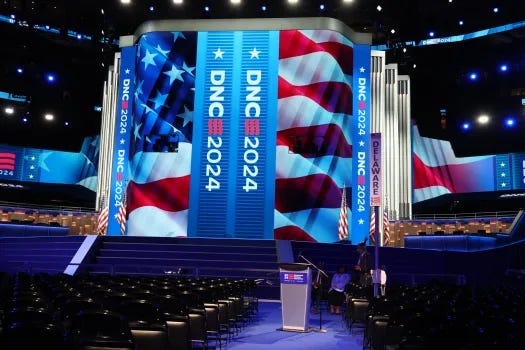Should Harris expect a convention bounce?
The past four weeks have been like a slow-motion, and sometimes fast-motion, convention
Unlike my work at the Republican convention in Milwaukee last month, I will not be attending the Democratic convention in Chicago this week. Rather, I am in the process of moving to Tennessee to begin my one-year affiliation with the Center for the Study of Democratic Institutions at Vanderbilt. As you read this I am likely driving across Kansas and paying rapt attention to convention news and/or looking for my next EV charging station.
But let’s talk about this convention for a moment, because in many ways this is an unusual one. That is, it is not the Democratic convention we were expecting up until a month ago. Instead of re-nominating a fairly unpopular veteran politician who everyone already knew everything about, this convention will be nominating a more popular and younger politician about whom people know far less.
This could have been a very messy convention, had the broader Democratic Party not converged so quickly and so unanimously behind Kamala Harris.
Indeed, what we have seen from the Democratic Party since Biden’s withdrawal on July 21st is roughly the sort of thing that used to happen at conventions. The party suddenly found itself without a presidential nominee and the party’s voters had no direct means to weigh in, since the primaries and caucuses had transpired months earlier. So what happened was a series of very overt elite signals converging on an obvious coordination point. Biden endorsed Harris, then the Clintons did, then a whole bunch of members of Congress and governors did, and a bunch of key Democratic interest groups, and more. And with everyone’s enthusiastic backing and no rump caucus complaining about the pick, the party’s voters, who very clearly wanted someone to root for, rallied behind the party’s choice. If there were any complaints about this process being “undemocratic” or “illegitimate” because it was made by elites and not voters, those complaints were largely coming from Republicans.
All this is to say that the real work of the convention has already happened. Indeed, the roll call — one of the few actual bureaucratic tasks of the convention — happened two weeks ago. Instead of being contentious, this will likely be a unifying convention (at least inside the convention hall) that focuses on re-introducing the Vice President and her running mate to the country, although they’ve already done quite a bit of that barnstorming through the swing states over the past month.
Obviously, there will be a lot of key differences between this convention and the Republican one last month, but one stark one will be the choices of speakers. As Julia Azari and I discussed last month, a lot of the RNC convention speakers were people Trump had vanquished in primary elections — Marco Rubio, Nikki Haley, Ted Cruz, Ron DeSantis, etc. — but there were essentially no people there who had been prominent Republicans prior to Trump’s first candidacy announcement in 2015.
By contrast, Kamala Harris never really vanquished anyone in the primaries. Instead, she will be lauded by a range of party leaders — Bill and Hillary Clinton, Barack Obama, Joe Biden, etc. — dating back more than three decades. She will be positioned as the heir to a venerable party history, rather than its disruptor.
So will there be any sort of convention bounce for the Harris-Walz ticket? It’s possible, in large part because she is relatively less known than either Biden or Trump. That is, the rollout of her campaign so far has been very effective, generating a good deal of positive press, catching Republicans off-guard with no clear counter-messaging, and boosting her favorability ratings by around eight points. It’s possible this four-day national messaging campaign will continue that success, exposing the ticket and its message to a broader array of voters.
One reason to think it won’t produce much of a bounce, however, is that a lot of the work has already been done. That is, while Harris and Walz have been campaigning in swing states, they’ve been getting a lot of national coverage in the process, and it’s not clear that the convention will change that very much. Also, we live in an era of negligibly small convention effects.
But if the Harris team is as effective in managing this convention as they have in running the campaign so far, and if the opposition continues its approach of just throwing a new insult at the wall every day to see if it sticks, it’s possible this convention will do her campaign some real good.






Very astute point about how the recent process was similar to the way conventions used to operate. I’ve definitely seen some leftists griping online about the way it played out, but I think you are generally correct that the grousing is mostly from the GOP.
Yuppers. It’s a beautiful thing.